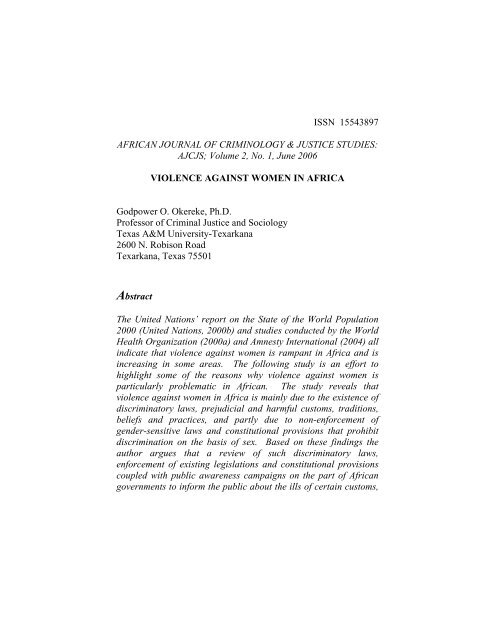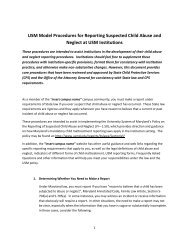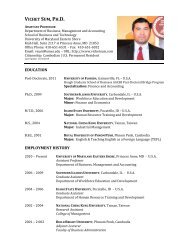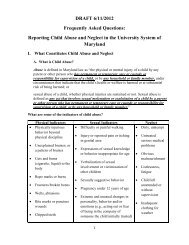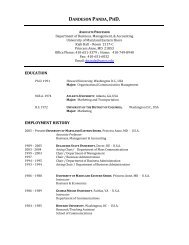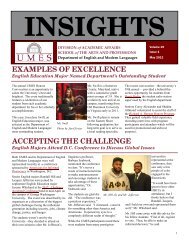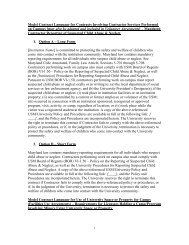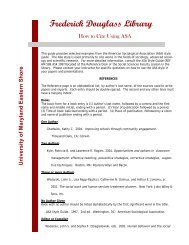violence against women in Africa
violence against women in Africa
violence against women in Africa
Create successful ePaper yourself
Turn your PDF publications into a flip-book with our unique Google optimized e-Paper software.
ISSN 15543897<br />
AFRICAN JOURNAL OF CRIMINOLOGY & JUSTICE STUDIES:<br />
AJCJS; Volume 2, No. 1, June 2006<br />
VIOLENCE AGAINST WOMEN IN AFRICA<br />
Godpower O. Okereke, Ph.D.<br />
Professor of Crim<strong>in</strong>al Justice and Sociology<br />
Texas A&M University-Texarkana<br />
2600 N. Robison Road<br />
Texarkana, Texas 75501<br />
Abstract<br />
The United Nations’ report on the State of the World Population<br />
2000 (United Nations, 2000b) and studies conducted by the World<br />
Health Organization (2000a) and Amnesty International (2004) all<br />
<strong>in</strong>dicate that <strong>violence</strong> <strong>aga<strong>in</strong>st</strong> <strong>women</strong> is rampant <strong>in</strong> <strong>Africa</strong> and is<br />
<strong>in</strong>creas<strong>in</strong>g <strong>in</strong> some areas. The follow<strong>in</strong>g study is an effort to<br />
highlight some of the reasons why <strong>violence</strong> <strong>aga<strong>in</strong>st</strong> <strong>women</strong> is<br />
particularly problematic <strong>in</strong> <strong>Africa</strong>n. The study reveals that<br />
<strong>violence</strong> <strong>aga<strong>in</strong>st</strong> <strong>women</strong> <strong>in</strong> <strong>Africa</strong> is ma<strong>in</strong>ly due to the existence of<br />
discrim<strong>in</strong>atory laws, prejudicial and harmful customs, traditions,<br />
beliefs and practices, and partly due to non-enforcement of<br />
gender-sensitive laws and constitutional provisions that prohibit<br />
discrim<strong>in</strong>ation on the basis of sex. Based on these f<strong>in</strong>d<strong>in</strong>gs the<br />
author argues that a review of such discrim<strong>in</strong>atory laws,<br />
enforcement of exist<strong>in</strong>g legislations and constitutional provisions<br />
coupled with public awareness campaigns on the part of <strong>Africa</strong>n<br />
governments to <strong>in</strong>form the public about the ills of certa<strong>in</strong> customs,
Violence Aga<strong>in</strong>st Women<br />
Godpower Okereke.<br />
traditions, beliefs and practices will help stem the tide of <strong>violence</strong><br />
<strong>aga<strong>in</strong>st</strong> <strong>women</strong> <strong>in</strong> <strong>Africa</strong>.<br />
Background:<br />
In a statement to the Fourth World Conference on Women <strong>in</strong><br />
Beij<strong>in</strong>g, Ch<strong>in</strong>a <strong>in</strong> September 1995, the then Secretary-General of<br />
the United Nations, Boutros Boutros-Ghali said that <strong>violence</strong><br />
<strong>aga<strong>in</strong>st</strong> <strong>women</strong> is a universal problem that must be universally<br />
condemned (United Nations, 1996). He made the statement <strong>in</strong><br />
reaction to the ris<strong>in</strong>g <strong>in</strong>cidence of various types of <strong>violence</strong> <strong>aga<strong>in</strong>st</strong><br />
<strong>women</strong> <strong>in</strong> both developed and develop<strong>in</strong>g nations. Especially<br />
troubl<strong>in</strong>g are high <strong>in</strong>cidences of rape, domestic <strong>violence</strong>, “honor”<br />
kill<strong>in</strong>gs, human traffick<strong>in</strong>g, prostitution, forced servitude, forced<br />
and early marriages, female genital mutilation (FGM) and sexual<br />
slavery (Committee on the Elim<strong>in</strong>ation of Discrim<strong>in</strong>ation Aga<strong>in</strong>st<br />
Women, 2000). The Platform for Action-the core document for<br />
the Beij<strong>in</strong>g Conference-noted that <strong>violence</strong> <strong>aga<strong>in</strong>st</strong> <strong>women</strong><br />
constituted a violation of <strong>women</strong>’s basic human rights and is an<br />
obstacle to the achievement of gender equality and development<br />
and peace around the world (Ganny, 1996; Nosike, 1996; United<br />
Nations, 2000a). Although the United Nations has been concerned<br />
with the issue of the advancement of <strong>women</strong>’s rights s<strong>in</strong>ce its<br />
found<strong>in</strong>g, but, the alarm<strong>in</strong>g global dimensions of female-targeted<br />
<strong>violence</strong> was not made a top priority of the <strong>in</strong>ternational<br />
community until December 1993 (follow<strong>in</strong>g the June 1993 World<br />
Conference on Human Rights <strong>in</strong> Vienna which laid the<br />
groundwork for elim<strong>in</strong>at<strong>in</strong>g <strong>violence</strong> <strong>aga<strong>in</strong>st</strong> <strong>women</strong>), when the<br />
United Nations General Assembly adopted the Declaration on the<br />
2
AJCJS: AFRICAN JOURNAL OF CRIMINOLOGY & JUSTICE<br />
STUDIES, Volume 2, No.1, June 2006<br />
Elim<strong>in</strong>ation of Violence Aga<strong>in</strong>st Women (Women’s International<br />
Network, 2002).<br />
The Declaration on the Elim<strong>in</strong>ation of Violence Aga<strong>in</strong>st Women<br />
(DEVAW) def<strong>in</strong>es <strong>violence</strong> <strong>aga<strong>in</strong>st</strong> <strong>women</strong> as “any act of genderbased<br />
<strong>violence</strong> that results <strong>in</strong> or is likely to result <strong>in</strong>, physical,<br />
sexual or mental harm or suffer<strong>in</strong>g to <strong>women</strong>, <strong>in</strong>clud<strong>in</strong>g threats of<br />
such acts, coercion or arbitrary deprivation of liberty, whether<br />
occurr<strong>in</strong>g <strong>in</strong> public or <strong>in</strong> private life” (World Health Organization,<br />
2000a). DEVAW notwithstand<strong>in</strong>g, female-targeted <strong>violence</strong> is<br />
still a major problem <strong>in</strong> the world today (Amnesty International,<br />
2004). The United Nations’ report on: The State of the World<br />
Population, 2000, noted that gender-based <strong>violence</strong> still constitutes<br />
a life-long threat to hundreds of millions of <strong>women</strong> and girls across<br />
the globe (United Nations, 2000b). Also, <strong>in</strong> the year 2000, the<br />
World Health Organization stated that <strong>in</strong> every country where<br />
reliable studies have been done, results <strong>in</strong>dicate that between 10%<br />
and 50% of the <strong>women</strong> have been physically abused <strong>in</strong> their life<br />
time and that between 12% and 25% have experienced attempted<br />
or completed rape (World Health Organization, 2000a). Both<br />
reports noted that <strong>violence</strong> <strong>aga<strong>in</strong>st</strong> <strong>women</strong> is particularly rampant<br />
<strong>in</strong> <strong>Africa</strong>. Further, Amnesty International (2004), adds that<br />
because the human rights situation across <strong>Africa</strong> is characterized<br />
by widespread armed-conflict, political repression, poverty and<br />
social <strong>in</strong>equality, persecution of human rights defenders, and<br />
<strong>violence</strong> <strong>aga<strong>in</strong>st</strong> <strong>women</strong>, <strong>women</strong> <strong>in</strong> <strong>Africa</strong> are at risk of <strong>violence</strong><br />
whatever their circumstance. This paper, which resulted from an<br />
extensive review of available <strong>in</strong>formation on both the status of<br />
<strong>women</strong> and girls <strong>in</strong> <strong>Africa</strong> and the subject of <strong>violence</strong> <strong>aga<strong>in</strong>st</strong><br />
3
Violence Aga<strong>in</strong>st Women<br />
Godpower Okereke.<br />
<strong>women</strong> <strong>in</strong> <strong>Africa</strong> adopts the DEVAW def<strong>in</strong>ition of <strong>violence</strong><br />
<strong>aga<strong>in</strong>st</strong> <strong>women</strong> and highlights some of the reasons why abuse of<br />
<strong>women</strong> is so problematic with<strong>in</strong> the cont<strong>in</strong>ent. The paper also<br />
notes some positive actions taken by the governments of some of<br />
the countries to deal with this problem. Some of the problematic<br />
areas are identified below.<br />
Non-Enforcement of Exist<strong>in</strong>g Legislations and Provisions of<br />
National Constitutions:<br />
First and foremost, there is a pervasive lack of enforcement of<br />
exist<strong>in</strong>g legislations that are gender-sensitive <strong>in</strong> many <strong>Africa</strong>n<br />
countries. For example, the Ghanaian Parliament <strong>in</strong> 1998, passed<br />
the Crim<strong>in</strong>al Code Amendment Bill bann<strong>in</strong>g all forms of ritualized<br />
enslavement (The Ark Foundation, 2005). But, accord<strong>in</strong>g to Aird<br />
(2003), ritualized forced labor is still practiced <strong>in</strong> Ghana,<br />
specifically due to non-enforcement of the law. Similarly, female<br />
genital mutilation (FGM)-a custom that is practiced <strong>in</strong> vary<strong>in</strong>g<br />
degrees <strong>in</strong> some 28 countries <strong>in</strong> <strong>Africa</strong>-(Amnesty International,<br />
2003 and 2004; Dowuona, 2005; Human Rights Watch, 2002;<br />
World Health Organization, 2000b) has been outlawed <strong>in</strong> 14<br />
countries but the practice still goes on and perpetrators have only<br />
been prosecuted <strong>in</strong> Burk<strong>in</strong>a Faso, Ghana, Senegal, and Sierra<br />
Leone (<strong>Africa</strong>n News Agency-AFROL News, 2006; Amnesty<br />
International, 2003 and 2004). Further, <strong>in</strong> Uganda, the 1972<br />
Succession (Amendment) Decree which was <strong>in</strong>tended to recognize<br />
<strong>women</strong>’s right to <strong>in</strong>herit from their husbands and fathers and the<br />
2003 Land Act (Amendment) Bill which was <strong>in</strong>tended to provide<br />
widows greater protection from eviction from their matrimonial<br />
home follow<strong>in</strong>g the death of their husbands are largely not<br />
enforced (Human Rights Watch, 2003a; 2005). Also, <strong>in</strong> 1971<br />
4
AJCJS: AFRICAN JOURNAL OF CRIMINOLOGY & JUSTICE<br />
STUDIES, Volume 2, No.1, June 2006<br />
Tanzania passed the Marriage Act which prohibited corporal<br />
punishment of wives by husbands and granted spouses equal rights<br />
to property acquired through jo<strong>in</strong>t efforts. Accord<strong>in</strong>g to Gonzalez-<br />
Barenes (2004), Tanzanian <strong>women</strong> are still denied these rights due<br />
to non-enforcement of the law by the government of Tanzania.<br />
Furthermore, the Penal Code <strong>in</strong> Zambia prohibits virtually all<br />
abuses associated with sexual <strong>violence</strong>, coercion, and<br />
discrim<strong>in</strong>ation based on sex but Zambian <strong>women</strong> cont<strong>in</strong>ue to suffer<br />
these violations due to the fact these provisions are not enforced<br />
(Human Rights Watch, 2003b). Even <strong>in</strong> Mauritius where domestic<br />
<strong>violence</strong> is prohibited by law, a 2001 survey revealed that 84% of<br />
the <strong>women</strong> reported be<strong>in</strong>g victims of physical abuse partly due to<br />
non-enforcement of the law (Human Rights Watch, 2003c).<br />
Further, <strong>in</strong> the Republic of Ben<strong>in</strong>, the Agrarian and Land Reform<br />
Legislation which was passed <strong>in</strong> 1985 to give <strong>women</strong> and men<br />
equal <strong>in</strong>heritance and property rights is not enforced as is the<br />
Individual and Family Code <strong>in</strong> Burk<strong>in</strong>a Faso which provides for<br />
equality before the law between men and <strong>women</strong> (United Nations,<br />
2003a). Also, <strong>in</strong> the Republic of Congo, the law which specifies<br />
that 30% of a husband’s estate should go to his wife upon his death<br />
is not enforced and as a result, <strong>women</strong> still lose everyth<strong>in</strong>g upon<br />
the death of their husbands (United Nations, 2003a). Although<br />
abduction of <strong>women</strong> and girls as a form of marriage <strong>in</strong> Ethiopia<br />
has been outlawed, the practice still goes on due to nonenforcement<br />
of the prohibition (Equality Now, 2002; United<br />
Nations, 2003b; Women’s Action Network, 2005). Also, the<br />
constitution of every country <strong>in</strong> <strong>Africa</strong> either explicitly or<br />
<strong>in</strong>directly guarantees equal rights to all citizens <strong>in</strong>clud<strong>in</strong>g clauses<br />
5
Violence Aga<strong>in</strong>st Women<br />
Godpower Okereke.<br />
that prohibit discrim<strong>in</strong>ation on the basis of sex. But, as Human<br />
Rights Watch (2000) po<strong>in</strong>ts out, the governments of <strong>Africa</strong>n<br />
countries have failed to enforce the provisions of their<br />
constitutions and implement policies that reflect the pr<strong>in</strong>ciples of<br />
gender equality found <strong>in</strong> both regional and <strong>in</strong>ternational human<br />
rights documents to which they are signatories. In some <strong>in</strong>stances,<br />
the civil rights organization says, the government itself violates the<br />
provisions of the country’s constitution with impunity. For<br />
example, whereas the Constitution of Mauritania provides for<br />
equality before the law for all citizens, regardless of race, national<br />
orig<strong>in</strong>, sex, or social status, and prohibits racial and ethnic<br />
propaganda, <strong>in</strong> practice, the Government often favors <strong>in</strong>dividuals<br />
on the basis of ethnic and tribal affiliation, social status, and<br />
political ties (United Nations, 2003a). If the government does not<br />
respect the constitution of the country, it would be very difficult to<br />
get societal <strong>in</strong>stitutions and/or <strong>in</strong>dividuals to respect it.<br />
It is common experience <strong>in</strong> <strong>Africa</strong>n countries that the law <strong>in</strong> theory<br />
and the law <strong>in</strong> practice rema<strong>in</strong> estranged; <strong>in</strong>dividual citizens and<br />
sometimes government officials and agents do not th<strong>in</strong>k that the<br />
law is for them to obey. For example, whereas statutory, civil or<br />
general law <strong>in</strong> <strong>Africa</strong>n countries set the age of marriage at between<br />
15 and 21, under customary and/or Islamic laws of some of the<br />
countries, girls are marriageable at 12 and <strong>in</strong> some <strong>in</strong>stances of<br />
arranged and/or forced marriages, girls are married off at a much<br />
younger age (Human Rights Watch, 2003b). Even, those<br />
governments that have responded positively to <strong>violence</strong> <strong>aga<strong>in</strong>st</strong><br />
<strong>women</strong> by enact<strong>in</strong>g gender-sensitive laws, amend<strong>in</strong>g exist<strong>in</strong>g laws<br />
and/or by review<strong>in</strong>g their policies to be gender sensitive often fall<br />
short <strong>in</strong> the implementation of those policies and/or laws<br />
6
AJCJS: AFRICAN JOURNAL OF CRIMINOLOGY & JUSTICE<br />
STUDIES, Volume 2, No.1, June 2006<br />
(Mutandavari, 2000). While it is one th<strong>in</strong>g to legislatively set the<br />
age of marriage, it is another to get people to abide by such law<br />
especially if the government does not have any enforcement<br />
strategy <strong>in</strong> place. Consequently, greater numbers of <strong>women</strong> <strong>in</strong><br />
<strong>Africa</strong> cont<strong>in</strong>ue to be victims of gender-based <strong>violence</strong> (Archer,<br />
2002).<br />
Discrim<strong>in</strong>atory Laws:<br />
LaShawn R. Jefferson, Executive Director of Human Rights<br />
Watch’s Women’s Rights Division once said: “Discrim<strong>in</strong>atory<br />
laws, <strong>in</strong>clud<strong>in</strong>g certa<strong>in</strong> <strong>in</strong>terpretations of Sharia, are a pernicious<br />
and chronic threat to <strong>women</strong>’s very existence” (Human Rights<br />
Watch, 2001). No where is this statement more true than <strong>in</strong> <strong>Africa</strong><br />
where many aspects of statutory law, civil law, general law, or<br />
customary law <strong>in</strong> many countries discrim<strong>in</strong>ate <strong>aga<strong>in</strong>st</strong> <strong>women</strong> and<br />
girls and <strong>in</strong> so do<strong>in</strong>g, make them vulnerable to gender-based<br />
<strong>violence</strong>. For example, Article 7 of the Trade Code <strong>in</strong> Cameroon<br />
allows a husband to oppose his wife’s rights to work if the protest<br />
is made <strong>in</strong> the <strong>in</strong>terest of the family and accord<strong>in</strong>g to Articles 1421<br />
and 1428 of the Civil Code, Cameroonian <strong>women</strong> are not fully<br />
entitled to use, enjoy or sell their own property. Article 1421<br />
grants husbands the right to adm<strong>in</strong>ister communal property which<br />
means that the husband has the legal right to sell or mortgage the<br />
couple’s property without the wife’s consent and Articles 108 and<br />
215 grant husbands the sole right to determ<strong>in</strong>e the family domicile<br />
(Committee on the Elim<strong>in</strong>ation of Discrim<strong>in</strong>ation Aga<strong>in</strong>st Women,<br />
2000). Also, Section 361 of the Penal Code <strong>in</strong> Cameroon<br />
crim<strong>in</strong>alizes adultery, but the provisions differ depend<strong>in</strong>g upon<br />
whether the adulterer is the wife or the husband. This law provides<br />
7
Violence Aga<strong>in</strong>st Women<br />
Godpower Okereke.<br />
that if a married woman has sexual <strong>in</strong>tercourse with a man who is<br />
not her husband, such a woman shall be punished and that any<br />
married man who has sexual <strong>in</strong>tercourse <strong>in</strong> the matrimonial home,<br />
or habitually has sexual <strong>in</strong>tercourse elsewhere, with a woman who<br />
is not his wife, such a man shall be punished (International<br />
Women’s Rights Action Watch, 1999). While all adultery is a<br />
crim<strong>in</strong>al offense for <strong>women</strong>, it is a crime for men depend<strong>in</strong>g on the<br />
venue or if the adultery is habitual. Accord<strong>in</strong>g to the United<br />
Nations (2003b), these discrim<strong>in</strong>atory provisions of the law <strong>aga<strong>in</strong>st</strong><br />
<strong>women</strong> <strong>in</strong> Cameroon have resulted <strong>in</strong> low status of Cameroonian<br />
<strong>women</strong> <strong>in</strong> all aspects of life. These blatant discrim<strong>in</strong>atory<br />
provisions of the law <strong>in</strong>crease <strong>women</strong>’s vulnerability to <strong>violence</strong>.<br />
Further, by law <strong>in</strong> Mozambique, a woman must have the written<br />
approval of her father, husband, or a close male relative <strong>in</strong> order to<br />
start a bus<strong>in</strong>ess, obta<strong>in</strong> a loan, lease property, or contract for goods<br />
and services (United Nations, 2003b). Aga<strong>in</strong>, while the 1971 Law<br />
of Marriage Act <strong>in</strong> Tanzania prohibits the alienation of the<br />
matrimonial home without the consent of the other spouse it<br />
paradoxically provides that the wife loses this right if the marriage<br />
term<strong>in</strong>ates either by divorce or death (The World Bank Group,<br />
1999). Also, the 1960 Civil Code of the Empire of Ethiopia<br />
designates the husband as the head of the family and gives him the<br />
authority to adm<strong>in</strong>ister household property. This code gives<br />
husbands the right to control and manage common property and to<br />
make all decisions regard<strong>in</strong>g such property. While the code<br />
requires that the husband acts judiciously and not alienate any<br />
property without the consent of his wife, strong traditional and<br />
cultural beliefs discourage <strong>women</strong> from enforc<strong>in</strong>g this requirement<br />
(The World Bank, 1999:1).<br />
8
AJCJS: AFRICAN JOURNAL OF CRIMINOLOGY & JUSTICE<br />
STUDIES, Volume 2, No.1, June 2006<br />
Also, marriage and family law <strong>in</strong> the Republic of Congo stipulates<br />
that adultery is a crime for <strong>women</strong> but not for men (United<br />
Nations, 2003a). Family Code <strong>in</strong> the Democratic Republic of<br />
Congo (as <strong>in</strong> most <strong>Africa</strong>n countries) holds that the husband is the<br />
head of the household and provides that his duty is to protect his<br />
wife whereas the wife owes her obedience to her husband (United<br />
Nations, 2003a:152). Further, written law <strong>in</strong> many <strong>Africa</strong>n<br />
countries does not recognize common-law marriages irrespective<br />
of the number of years the couple lived together, the number of<br />
children born, and the jo<strong>in</strong>t property acquired dur<strong>in</strong>g those years.<br />
If the union breaks, the woman and the children are thrown out of<br />
what is assumed to be the man’s home by his family. For example,<br />
a Namibian law provides that illegitimate children cannot, unlike<br />
children born <strong>in</strong> wedlock, automatically <strong>in</strong>herit from their father if<br />
he dies without leav<strong>in</strong>g a will (<strong>Africa</strong>n News Agency-AFROL<br />
News, 2001).<br />
With the exception of Cameroon, Mauritania and South <strong>Africa</strong>, the<br />
law <strong>in</strong> <strong>Africa</strong> does not recognize marital rape as a crime (BBC,<br />
1999; Human Rights Watch, 1997). Even if the behavior is illegal<br />
under statutory law <strong>in</strong> Cameroon, forced sexual <strong>in</strong>tercourse with a<br />
spouse is tolerated under customary law because it is culturally<br />
accepted that consent to marriage constitutes unlimited consent to<br />
sexual <strong>in</strong>tercourse (Human Rights Watch, 2002 and 2003a;<br />
Tetchiada, 2005). Efforts to crim<strong>in</strong>alize marital rape <strong>in</strong> Nigeria,<br />
Ghana, Kenya, Uganda, Liberia, Democratic Republic of Congo,<br />
Sierra Leone and other countries <strong>in</strong> <strong>Africa</strong> have been defeated by<br />
male members of parliament or male government officials<br />
(Amnesty International, 2006). The law <strong>in</strong> many <strong>Africa</strong>n countries<br />
9
Violence Aga<strong>in</strong>st Women<br />
Godpower Okereke.<br />
also permits men to have two or more wives simultaneously but<br />
does not allow polyandry and spousal abuse is not a legal or<br />
sufficient ground for divorce (Gambia is an exception).<br />
Furthermore, the law <strong>in</strong> some countries even permits husbands to<br />
beat their wives (New York University School of Law, 2004). In<br />
Nigeria for example, the Penal Code permits husbands to “correct”<br />
their wives as long as such “correction” does not result <strong>in</strong> grievous<br />
harm which is def<strong>in</strong>ed as loss of sight, hear<strong>in</strong>g, power of speech,<br />
facial disfigurement or other life-endanger<strong>in</strong>g <strong>in</strong>juries (Women<br />
International Network, 1998 and 2002). In Kenya, Mozambique,<br />
Nigeria, Swaziland, and Togo a married adult woman cannot be<br />
issued an <strong>in</strong>ternational travel<strong>in</strong>g passport without her husband’s<br />
written consent nor would she have their m<strong>in</strong>or children’s names<br />
endorsed on her passport without their father’s approval (League<br />
of Democratic Women, 2005). Also, nationality laws <strong>in</strong> Egypt,<br />
Liberia, Morocco, Nigeria and Zambia discrim<strong>in</strong>ate <strong>aga<strong>in</strong>st</strong><br />
<strong>women</strong>. For example, whereas men from these countries can<br />
transmit their nationality to their children wherever they are born<br />
and whoever their mothers are, <strong>women</strong>, on the other hand, do not<br />
have the same right (International Women’s Rights Action Watch,<br />
1999).<br />
Furthermore, <strong>women</strong> <strong>in</strong> many <strong>Africa</strong> countries seek<strong>in</strong>g to formally<br />
term<strong>in</strong>ate violent marriages through divorce face enormous legal<br />
obstacles. S<strong>in</strong>ce abuse and/or adultery on the part of the man is not<br />
a sufficient ground for divorce <strong>in</strong> many countries, a woman cannot<br />
simply accuse her husband of abuse or adultery to term<strong>in</strong>ate their<br />
marriage; she must couple her claim with either cruelty and/or<br />
desertion or claim that the adultery was <strong>in</strong>cestuous (Hajjar, 2004).<br />
There is no such legal requirement for men. So, whereas divorce is<br />
10
AJCJS: AFRICAN JOURNAL OF CRIMINOLOGY & JUSTICE<br />
STUDIES, Volume 2, No.1, June 2006<br />
a permissible option under marriage and divorce laws of most<br />
<strong>Africa</strong>n countries, <strong>in</strong> reality, it is treated as a male prerogative;<br />
men can divorce their wives without any verifiable justification<br />
(Amnesty International, 2005a). In other words, <strong>women</strong> can easily<br />
be divorced but not seek divorce. Under these types of legal<br />
discrim<strong>in</strong>ation, it should not be surpris<strong>in</strong>g then that <strong>violence</strong><br />
<strong>aga<strong>in</strong>st</strong> <strong>women</strong> <strong>in</strong> <strong>Africa</strong> cont<strong>in</strong>ues to be a major concern of both<br />
domestic and <strong>in</strong>ternational human rights organizations (Amnesty<br />
International, 2004). The law also discrim<strong>in</strong>ates <strong>aga<strong>in</strong>st</strong> <strong>women</strong> <strong>in</strong><br />
the manner <strong>in</strong> which it punishes people who assault others. For<br />
example, the Crim<strong>in</strong>al Code for Southern Nigeria prescribes<br />
different sentences for the crime of assault depend<strong>in</strong>g on whether<br />
the victim of the attack is a man or a woman. Whereas assault on a<br />
man is a felony and carries a prison term of three years, assault on<br />
the woman is a misdemeanor and carries a prison term of two years<br />
(Amnesty International, 2004).<br />
Also, Personal Status Codes of Morocco and Egypt treat <strong>women</strong> as<br />
legal m<strong>in</strong>ors who do not even have the legal autonomy to conclude<br />
their own marriage contracts (Alami, 1992). These codes establish<br />
male authority over female members of the family. Under this<br />
situation, <strong>women</strong> are legally bound to obey male family members<br />
or their husbands if they are married. Failure to do so could and do<br />
give rise to <strong>violence</strong> <strong>aga<strong>in</strong>st</strong> <strong>women</strong> (Human Rights Watch,<br />
2003c). Aga<strong>in</strong>, marriage and divorce laws <strong>in</strong> Uganda discrim<strong>in</strong>ate<br />
<strong>aga<strong>in</strong>st</strong> <strong>women</strong> and contravene constitutional guarantees for<br />
nondiscrim<strong>in</strong>ation, equal protection of the law, and equal rights <strong>in</strong><br />
marriage, dur<strong>in</strong>g marriage, and at its dissolution. For example,<br />
Section 27 of the Divorce Act <strong>in</strong> Uganda stipulates that if a wife’s<br />
11
Violence Aga<strong>in</strong>st Women<br />
Godpower Okereke.<br />
adultery is the cause of a divorce, a court may order that the whole<br />
or part of the her property be settled for the benefit of the husband<br />
and/or the children (Human Rights Watch, 2003a). There is no<br />
such provision for men. And because the law <strong>in</strong> many <strong>Africa</strong>n<br />
countries still allows men to have two or more wives<br />
simultaneously the state is contribut<strong>in</strong>g to the problem of <strong>violence</strong><br />
<strong>aga<strong>in</strong>st</strong> <strong>women</strong> because polygamy exposes <strong>women</strong> to abuse<br />
(Human Rights Watch, 2003d).<br />
Harmful or Prejudicial Traditions, Customs, Beliefs and<br />
Practices:<br />
Not only is statutory, general or civil law <strong>in</strong> many countries <strong>in</strong><br />
<strong>Africa</strong> embedded <strong>in</strong> patriarchy or enforced <strong>in</strong> discrim<strong>in</strong>atory<br />
manner, <strong>Africa</strong>n culture, tradition, beliefs and practices are even<br />
more discrim<strong>in</strong>atory toward <strong>women</strong> and as a result, <strong>in</strong>crease their<br />
propensity to abuse (Kle<strong>in</strong>, 2004; Modo, 1996). The persistence of<br />
the problem of <strong>violence</strong> <strong>aga<strong>in</strong>st</strong> <strong>women</strong> has much to do with the<br />
fact that most of these physically and psychologically harmful<br />
customs are deeply rooted <strong>in</strong> the tradition and culture of the<br />
<strong>Africa</strong>n peoples. One of such practices is female genital mutilation<br />
(FGM). In spite of the health consequences of this practice, FGM<br />
is still practiced <strong>in</strong> 28 <strong>Africa</strong>n countries where the prevalence<br />
varies from 5 percent <strong>in</strong> the Democratic Republic of Congo and <strong>in</strong><br />
Uganda to 90, 97 and 98 percent <strong>in</strong> Ethiopia, Egypt, and Somalia<br />
respectively (<strong>Africa</strong>n News Agency-AFROL News, 2000b;<br />
AFROL News, 2003; Amnesty International, 2003) and is be<strong>in</strong>g<br />
performed on <strong>women</strong> liv<strong>in</strong>g <strong>in</strong> both Muslim and Christian<br />
communities (Amnesty International, 2004; Mba, 2002).<br />
12
AJCJS: AFRICAN JOURNAL OF CRIMINOLOGY & JUSTICE<br />
STUDIES, Volume 2, No.1, June 2006<br />
Also adversely affect<strong>in</strong>g <strong>women</strong> <strong>in</strong> <strong>Africa</strong> is the tradition of<br />
favor<strong>in</strong>g men <strong>in</strong> relation to <strong>in</strong>heritance issues. Customs regard<strong>in</strong>g<br />
<strong>in</strong>heritance of property <strong>in</strong> both families of orig<strong>in</strong> and marital<br />
families <strong>in</strong> <strong>Africa</strong>n countries are prejudicial toward <strong>women</strong> and<br />
girls (World Bank Group, 2000) even when statutory law<br />
recognizes <strong>women</strong>’s right to <strong>in</strong>herit property. For example, despite<br />
the decision of the Cameroonian Supreme Court recogniz<strong>in</strong>g<br />
<strong>women</strong>’s rights to be granted land and the existence of Cameroon’s<br />
Law of Succession which grants <strong>women</strong> equal rights with regard to<br />
<strong>in</strong>heritance, discrim<strong>in</strong>atory <strong>in</strong>heritance customs still deny <strong>women</strong><br />
this right (International Women’s Rights Action Watch, 1999).<br />
This customary prohibition <strong>aga<strong>in</strong>st</strong> <strong>women</strong> acquir<strong>in</strong>g property is<br />
even more s<strong>in</strong>ister among some ethnic groups where a married<br />
woman is considered part of her husband’s <strong>in</strong>heritance property<br />
comparable to her spouse’s personal property and real estate and<br />
upon his death, she herself could be <strong>in</strong>herited by her husband’s<br />
brother (<strong>Africa</strong>n News Agency-AFROL News, 2004; Human<br />
Rights Watch, 2003c; U.S. Department of State, 2004). As an old<br />
custom, wife <strong>in</strong>heritance was a way for men to take responsibility<br />
for their dead brother’s children and household but the fact that it<br />
can and is frequently forced on <strong>women</strong>, wife <strong>in</strong>heritance<br />
contributes to <strong>violence</strong> <strong>aga<strong>in</strong>st</strong> <strong>women</strong> with<strong>in</strong> the cont<strong>in</strong>ent<br />
because if she refuses to be <strong>in</strong>herited, she could be forced out of<br />
the marital home. This situation has left many <strong>women</strong> <strong>in</strong> <strong>Africa</strong><br />
poor and homeless. The desperation which results from practices<br />
such as the above contributes to the rapid spread of HIV/AIDS <strong>in</strong><br />
the region (Center on Hous<strong>in</strong>g Rights and Eviction, 2005).<br />
13
Violence Aga<strong>in</strong>st Women<br />
Godpower Okereke.<br />
Along the same l<strong>in</strong>e is the custom that requires the family of a<br />
prospective husband <strong>in</strong> many <strong>Africa</strong>n countries to pay a bride price<br />
or dowry <strong>in</strong> the form of money or gift to the family of the<br />
prospective wife (U.S. Department of State, 2005a and 2005b).<br />
Historically, this payment <strong>in</strong>dicated appreciation for the qualities<br />
and skills possessed by the bride and served to cement the<br />
relationship between the two families and their respective extended<br />
families (Okereke, 1992). Currently, this symbolic gesture is<br />
assumed to be equivalent to payment for a commodity and as <strong>in</strong><br />
any commercial transaction, entitles the husband-the buyer-to full<br />
ownership rights over his “purchase” (Amnesty International,<br />
2005b). Hav<strong>in</strong>g been “bought,” many <strong>women</strong> married under<br />
customary law have no authority with<strong>in</strong> what is seen as the man’s<br />
home (Amnesty International, 2005a). If the woman leaves her<br />
husband for any reason whatsoever, she is expected to return the<br />
bride price (Okereke, 1992). Accord<strong>in</strong>g to human rights<br />
organizations and the United Nations, this practice subjugates<br />
<strong>women</strong> to the unbridled authority of their husbands because it<br />
re<strong>in</strong>forces the <strong>in</strong>ferior status of <strong>women</strong> with<strong>in</strong> customary marriages<br />
(The League of Democratic Women, 2005; United Nations, 2002)<br />
and forces those who cannot repay the dowry to rema<strong>in</strong> <strong>in</strong> abusive<br />
relationships (Okereke, 2002).<br />
Also, customarily, wife beat<strong>in</strong>g is a “normal” part of marital<br />
relationship <strong>in</strong> parts of <strong>Africa</strong>. In fact, <strong>in</strong>terviews conducted by<br />
Human Rights Watch and other human rights organizations across<br />
<strong>Africa</strong> show that both men and <strong>women</strong> do not see any th<strong>in</strong>g wrong<br />
<strong>in</strong> a husband beat<strong>in</strong>g his wife every now and then (Human Rights<br />
Watch, 2001, 2002). Such studies even <strong>in</strong>dicate that a higher<br />
percentage of <strong>women</strong> than men approve of wife beat<strong>in</strong>g under<br />
14
AJCJS: AFRICAN JOURNAL OF CRIMINOLOGY & JUSTICE<br />
STUDIES, Volume 2, No.1, June 2006<br />
certa<strong>in</strong> circumstances (Human Rights Watch, 2003c). The League<br />
of Democratic Women (2005) holds that <strong>in</strong> addition to approv<strong>in</strong>g<br />
physical abuse of wives, <strong>women</strong> <strong>in</strong> some parts of <strong>Africa</strong> also<br />
perpetrate psychological <strong>violence</strong> on other <strong>women</strong> especially, <strong>in</strong><br />
the observance of widowhood rites which <strong>in</strong>clude shav<strong>in</strong>g the<br />
woman’s hair bald, mak<strong>in</strong>g her sit/sleep on the floor for certa<strong>in</strong><br />
length of time, mak<strong>in</strong>g her dr<strong>in</strong>k of water used to bath corpse,<br />
mak<strong>in</strong>g her jump over corpse/grave, mak<strong>in</strong>g her sit/sleep with<br />
corpse, mak<strong>in</strong>g her eat from a broken plate and not wash<strong>in</strong>g her<br />
hands thereafter, expect<strong>in</strong>g her to cry/wail early <strong>in</strong> the morn<strong>in</strong>gs,<br />
keep<strong>in</strong>g her <strong>in</strong> seclusion or restrict<strong>in</strong>g her movement for certa<strong>in</strong><br />
time period, mak<strong>in</strong>g her take an oath of <strong>in</strong>nocence, and<br />
dis<strong>in</strong>herit<strong>in</strong>g her of property acquired with spouse. In contrast, it<br />
says, a widower is often showered with sympathy and compassion<br />
on the death of his wife. To console him, a woman could be<br />
procured for the widower even on the night of the wife’s death to<br />
keep him “company”.<br />
Another traditional practice which <strong>in</strong>creases the vulnerability of<br />
<strong>Africa</strong>n <strong>women</strong> to <strong>violence</strong> is marriage by abduction. In Ethiopia,<br />
for example, men kidnap and rape girls they want to marry and as<br />
long as the abductor pays the girl’s family some money and agrees<br />
to marry her, this rape is not punishable by law (BBC, 2001;<br />
Equality Now, 2002; Women’s Action Network, 2005). Also<br />
adversely affect<strong>in</strong>g many <strong>women</strong> <strong>in</strong> many <strong>Africa</strong>n countries is the<br />
practice of giv<strong>in</strong>g young girls away <strong>in</strong> marriage to men more than<br />
twice their age to conform to tradition and to ensure that the girl is<br />
a virg<strong>in</strong> at marriage because prospective husbands pay more dowry<br />
money for virg<strong>in</strong>s than for non-virg<strong>in</strong>s (BBC, 2001:2). Accord<strong>in</strong>g<br />
15
Violence Aga<strong>in</strong>st Women<br />
Godpower Okereke.<br />
to the United Nations’ report on the world’s <strong>women</strong> (2000), 30<br />
percent of <strong>women</strong> aged 15 to 19 <strong>in</strong> sub-Saharan <strong>Africa</strong> have been<br />
married. Such early marriage <strong>in</strong>creases the <strong>women</strong>’s chance of<br />
dy<strong>in</strong>g from pregnancy-related causes which currently stands at 1 <strong>in</strong><br />
16 <strong>in</strong> <strong>Africa</strong> (Amnesty International, 2004). Also contribut<strong>in</strong>g to<br />
<strong>violence</strong> <strong>aga<strong>in</strong>st</strong> <strong>women</strong> <strong>in</strong> <strong>Africa</strong> is the differential treatment of<br />
boys and girls with<strong>in</strong> <strong>Africa</strong>n societies. <strong>Africa</strong>n culture reserves<br />
most domestic chores for girls and treats boys like little lords.<br />
Among some ethnic groups, a woman’s value is relative to the<br />
number of male children she bears. A married woman who has all<br />
girl children <strong>in</strong> such communities is accorded little respect and <strong>in</strong><br />
some <strong>in</strong>stances could be forced by social pressure to cont<strong>in</strong>ue to<br />
have children <strong>in</strong> search of a boy. Accord<strong>in</strong>g to Hanson (2002) the<br />
special and preferential treatment given to boys by both his parents<br />
and the community sub-consciously tells them that th<strong>in</strong>gs should<br />
always go their way and that when they do not, that it is okay to<br />
throw violent tantrums to get their wishes met. Unfortunately,<br />
these lion cubs grow up to be lions <strong>in</strong> society and <strong>in</strong> their marital<br />
families.<br />
Religious Fundamentalism:<br />
It has been postulated that fundamentalist <strong>in</strong>terpretations of Islam<br />
<strong>in</strong> parts of <strong>Africa</strong> also contribute to <strong>violence</strong> <strong>aga<strong>in</strong>st</strong> <strong>women</strong><br />
(Amnesty International, 2005b) because such <strong>in</strong>terpretations treat<br />
<strong>women</strong> as legal m<strong>in</strong>ors and accord men the status of heads of their<br />
families with guardianship authority over and responsibility for all<br />
members of the family <strong>in</strong>clud<strong>in</strong>g adult <strong>women</strong> (Human Rights<br />
Watch, 2001). Under such <strong>in</strong>terpretations, <strong>women</strong> have a duty to<br />
obey their guardians-husbands, fathers or other male heads of the<br />
family-and failure to do so, could result <strong>in</strong> <strong>violence</strong>. In some<br />
16
AJCJS: AFRICAN JOURNAL OF CRIMINOLOGY & JUSTICE<br />
STUDIES, Volume 2, No.1, June 2006<br />
communities, such <strong>in</strong>terpretations emphasize the men’s “right” to<br />
have up to four wives without a correspond<strong>in</strong>g emphasis on the<br />
conditions attached to this norm (Hajjar, 2004). In some <strong>in</strong>stances,<br />
such <strong>in</strong>terpretations emphasize the men’s “responsibility” to<br />
control <strong>women</strong>’s behavior as is evident <strong>in</strong> a decision handed out by<br />
a Sharia court <strong>in</strong> northern Nigeria (Wilson, 2003) where an<br />
appellate Sharia court upheld a death by ston<strong>in</strong>g sentence <strong>aga<strong>in</strong>st</strong> a<br />
woman who allegedly had sex outside marriage while sett<strong>in</strong>g free<br />
the man she allegedly had sex with on the ground that the court<br />
lacked sufficient evidence to prosecute him for the alleged adultery<br />
(Human Rights Watch, 2001). Also, under the Maliki School of<br />
Thought, dom<strong>in</strong>at<strong>in</strong>g <strong>in</strong>terpretations of Sharia Penal Codes <strong>in</strong> the<br />
12 northern states <strong>in</strong> Nigeria which have <strong>in</strong>troduced them s<strong>in</strong>ce<br />
1999, pregnancy out of wedlock is considered sufficient ground to<br />
condemn a woman to death while a mere oath by the man deny<strong>in</strong>g<br />
hav<strong>in</strong>g had sexual <strong>in</strong>tercourse with the woman is often considered<br />
sufficient proof of <strong>in</strong>nocence unless four <strong>in</strong>dependent and<br />
reputable eye-witnesses (usually men) declare his <strong>in</strong>volvement <strong>in</strong><br />
the act of voluntary <strong>in</strong>tercourse (Amnesty International, 2004).<br />
While the author believes <strong>in</strong> religious freedom and expects the<br />
government to respect both <strong>in</strong>dividual and group religious<br />
convictions, it is grossly unfair to <strong>in</strong>terpret or apply any religious<br />
tenets <strong>in</strong> a manner that is highly prejudicial toward <strong>women</strong>.<br />
Government Initiatives to Combat Violence Aga<strong>in</strong>st Women <strong>in</strong><br />
<strong>Africa</strong>:<br />
Collectively, <strong>Africa</strong>n countries have taken bold steps with<strong>in</strong> the<br />
last 10 to 15 years to strengthen the policy framework for the<br />
elim<strong>in</strong>ation of <strong>violence</strong> <strong>aga<strong>in</strong>st</strong> <strong>women</strong>. A part of these efforts has<br />
17
Violence Aga<strong>in</strong>st Women<br />
Godpower Okereke.<br />
been the creat<strong>in</strong>g and/or strengthen<strong>in</strong>g the policy framework at the<br />
<strong>in</strong>tergovernmental levels. For example, the <strong>Africa</strong>n Union<br />
(formerly, the Organization for <strong>Africa</strong>n Unity OAU) developed the<br />
Additional Protocol to the <strong>Africa</strong>n Charter on Human and Peoples’<br />
Rights <strong>in</strong> <strong>Africa</strong> to amplify the human rights of <strong>women</strong> as<br />
guaranteed by the <strong>Africa</strong>n Charter (United Nations, 2003a). The<br />
Additional Protocol acknowledges, re-affirms and guarantees the<br />
human rights of <strong>women</strong> and explicitly provides for the elim<strong>in</strong>ation<br />
of <strong>violence</strong> <strong>aga<strong>in</strong>st</strong> <strong>women</strong>. The <strong>Africa</strong>n Charter on Human and<br />
Peoples' Rights also established the <strong>Africa</strong>n Commission on<br />
Human and Peoples’ Rights as the pr<strong>in</strong>cipal organ for the<br />
promotion and protection of human and people’s rights with<strong>in</strong> the<br />
cont<strong>in</strong>ent. Countries <strong>in</strong> East <strong>Africa</strong> and the Horn of <strong>Africa</strong> formed<br />
the Intergovernmental Authority on Development (IGAD) to<br />
spearhead the campaign <strong>aga<strong>in</strong>st</strong> <strong>violence</strong> <strong>aga<strong>in</strong>st</strong> <strong>women</strong> and<br />
ma<strong>in</strong>stream gender and human rights activities with<strong>in</strong> the subregion.<br />
Further, three East <strong>Africa</strong>n States established the East<br />
<strong>Africa</strong>n Community <strong>in</strong> which the promotion of gender equality is<br />
identified as one of its objectives (Schwartz and Ong’wen, 2003).<br />
Also, the Heads of State and Government of the Southern <strong>Africa</strong>n<br />
Development Community (SADC) have adopted the Gender and<br />
Development Declaration as the framework for promot<strong>in</strong>g gender<br />
equality <strong>in</strong> all development activities <strong>in</strong> the sub-region (Human<br />
Rights Watch, 2002). Furthermore, the Economic Community for<br />
West <strong>Africa</strong> States (ECOWAS) under the ECOWAS Revised<br />
Treaty (1993) strengthened its policy framework to buttress its<br />
commitment to the enhancement of the economic, social and<br />
cultural conditions of <strong>women</strong>. In December 2001 the ECOWAS<br />
Summit of Heads of State and Government adopted the Political<br />
Declaration and the Action Plan on Traffick<strong>in</strong>g <strong>in</strong> Persons. The<br />
18
AJCJS: AFRICAN JOURNAL OF CRIMINOLOGY & JUSTICE<br />
STUDIES, Volume 2, No.1, June 2006<br />
Political Declaration underscores the commitment of the Heads of<br />
State and Government to the eradication of traffick<strong>in</strong>g <strong>in</strong> persons<br />
(Amnesty International, 2004).<br />
At the country level, the last decade or so witnessed significant<br />
policy and legislative reforms across the cont<strong>in</strong>ent to combat<br />
<strong>violence</strong> <strong>aga<strong>in</strong>st</strong> <strong>women</strong>. Most countries with<strong>in</strong> the cont<strong>in</strong>ent<br />
adopted gender-sensitive policies as a framework for work<strong>in</strong>g<br />
toward gender equality and/or passed gender-sensitive legislations<br />
designed to stem the tide of <strong>violence</strong> <strong>aga<strong>in</strong>st</strong> <strong>women</strong> with<strong>in</strong> the<br />
cont<strong>in</strong>ent or amended discrim<strong>in</strong>atory laws or constitutional<br />
provisions that were prejudicial toward <strong>women</strong> (United Nations,<br />
2003a). In other words, all countries <strong>in</strong> <strong>Africa</strong> have formally and<br />
explicitly acknowledged that <strong>violence</strong> <strong>aga<strong>in</strong>st</strong> <strong>women</strong> is an issue<br />
that should no longer be conf<strong>in</strong>ed to the private sphere; it should be<br />
tackled at both national and regional policy levels. A perusal of<br />
the specific policy actions taken by <strong>Africa</strong>n countries i <strong>in</strong>dicates a<br />
preponderance of legislative measures as the preferred method of<br />
respond<strong>in</strong>g to <strong>violence</strong> <strong>aga<strong>in</strong>st</strong> <strong>women</strong>. Consequently, laws<br />
prohibit<strong>in</strong>g female genital mutilation (FGM) have either been<br />
passed or are <strong>in</strong> the process of be<strong>in</strong>g passed <strong>in</strong> a majority of the 28<br />
countries where FGM is practiced <strong>in</strong> <strong>Africa</strong>. Even <strong>in</strong> those<br />
countries where such laws have not been passed, government<br />
agencies are tak<strong>in</strong>g steps to educate the public about the dangers of<br />
this age-long tradition. Similarly, laws provid<strong>in</strong>g for equality<br />
regard<strong>in</strong>g <strong>in</strong>heritance matters, laws deal<strong>in</strong>g with family, marriage<br />
and divorce issues, laws deal<strong>in</strong>g with marital property issues, laws<br />
deal<strong>in</strong>g with access to credit, right to education and <strong>in</strong>formation,<br />
laws barr<strong>in</strong>g discrim<strong>in</strong>ation <strong>in</strong> employment, laws forbidd<strong>in</strong>g sexual<br />
19
Violence Aga<strong>in</strong>st Women<br />
Godpower Okereke.<br />
harassment, laws prohibit<strong>in</strong>g forced servitude, laws proscrib<strong>in</strong>g<br />
human traffick<strong>in</strong>g, sexual slavery and exploitation of others, laws<br />
prohibit<strong>in</strong>g prostitution, laws prohibit<strong>in</strong>g gender-based assaults,<br />
and laws forbidd<strong>in</strong>g domestic <strong>violence</strong> have been passed or are<br />
be<strong>in</strong>g drafted, or debated <strong>in</strong> parliaments across the cont<strong>in</strong>ent<br />
(Human Rights Watch, 1997).<br />
Conclusion:<br />
From the forego<strong>in</strong>g, it is obvious that <strong>violence</strong> <strong>aga<strong>in</strong>st</strong> <strong>women</strong> is a<br />
major problem <strong>in</strong> <strong>Africa</strong>. It is also clear that governments <strong>in</strong><br />
<strong>Africa</strong> (regional and <strong>in</strong>dividual) are tak<strong>in</strong>g the necessary legislative<br />
steps to combat gender-based <strong>violence</strong> with<strong>in</strong> the cont<strong>in</strong>ent. The<br />
governments are also revis<strong>in</strong>g exist<strong>in</strong>g laws and constitutional<br />
provisions that discrim<strong>in</strong>ate <strong>aga<strong>in</strong>st</strong> <strong>women</strong> and girls. But, <strong>in</strong> spite<br />
of these steps, <strong>violence</strong> <strong>aga<strong>in</strong>st</strong> <strong>women</strong> and girls with<strong>in</strong> the<br />
cont<strong>in</strong>ent tends to cont<strong>in</strong>ue. In fact, some even believe that<br />
gender-based <strong>violence</strong> is <strong>in</strong>creas<strong>in</strong>g <strong>in</strong> <strong>Africa</strong> (Human Rights<br />
Watch, 2003c). It is clear to this author that the number of<br />
reported gender-based <strong>violence</strong> <strong>in</strong> many <strong>Africa</strong>n countries has<br />
<strong>in</strong>creased. Whether such <strong>in</strong>crease is due to the <strong>in</strong>creased public<br />
awareness activities and campaigns <strong>aga<strong>in</strong>st</strong> <strong>violence</strong> <strong>aga<strong>in</strong>st</strong><br />
<strong>women</strong> by both <strong>in</strong>ternational and domestic non-governmental<br />
organizations (NGOs) with<strong>in</strong> <strong>Africa</strong> or due to the legislative efforts<br />
of various governments <strong>in</strong> <strong>Africa</strong> or both, the follow<strong>in</strong>g should be<br />
noted.<br />
Firstly, <strong>Africa</strong>n society is highly patriarchal and has many<br />
traditions, customs, beliefs and practices that are highly<br />
discrim<strong>in</strong>atory toward <strong>women</strong> and girls. Specifically, the custom<br />
regard<strong>in</strong>g <strong>in</strong>heritance of property and the practice of wife<br />
20
AJCJS: AFRICAN JOURNAL OF CRIMINOLOGY & JUSTICE<br />
STUDIES, Volume 2, No.1, June 2006<br />
<strong>in</strong>heritance, payment of bride prices and forced and early<br />
marriages should be abandoned <strong>in</strong> light of their harmful effects on<br />
<strong>women</strong> and girls and their consequent effects on the <strong>Africa</strong>n<br />
society at large. To be successful <strong>in</strong> this regard, the governments<br />
of the various countries need to embark on extensive public<br />
enlightenment campaigns to educate both men and <strong>women</strong> about<br />
the ills of certa<strong>in</strong> customs, traditions, beliefs and practices and<br />
stereotypical views of men and <strong>women</strong> with<strong>in</strong> <strong>Africa</strong>. It is hoped<br />
that over time, people will beg<strong>in</strong> to see why certa<strong>in</strong> customs,<br />
traditions, beliefs and practices should be abandoned. Also, from<br />
all available scientific evidence, <strong>women</strong> derive no health benefits<br />
from circumcision or female genital mutilation (FGM). In fact, the<br />
World Health Organization (2000a) and the Center for<br />
Reproductive Law and Policy (2001) both state that FGM has<br />
detrimental health consequences for <strong>women</strong> who undergo this<br />
procedure no matter the age when the procedure was performed.<br />
They even po<strong>in</strong>t out that some of the <strong>women</strong> who undergo this<br />
procedure lose their lives or suffer permanent damages to their<br />
reproductive health due to complications result<strong>in</strong>g from the<br />
procedure. Furthermore, a recent study by the World Health<br />
Organization (WHO) <strong>in</strong>volv<strong>in</strong>g some 28,393 <strong>women</strong> at 28<br />
obstetric centers <strong>in</strong> 6 countries where FGM is common-Burk<strong>in</strong>a<br />
Faso, Ghana, Kenya, Nigeria, Senegal and Sudan-<strong>in</strong>dicates that<br />
<strong>women</strong> who undergo FGM are significantly more likely to<br />
experience difficulties dur<strong>in</strong>g childbirth and that their babies are<br />
more likely to die as a result of this practice (World Health<br />
Organization, 2006). The author supposes that it is <strong>in</strong> recognition<br />
of these dangers that about half of the countries where FGM is<br />
most prevalent <strong>in</strong> <strong>Africa</strong> has legislated <strong>aga<strong>in</strong>st</strong> this practice. The<br />
21
Violence Aga<strong>in</strong>st Women<br />
Godpower Okereke.<br />
rest of the countries need to do the same and those that have passed<br />
laws <strong>aga<strong>in</strong>st</strong> FGM should take all necessary steps to enforce such<br />
laws.<br />
Secondly, although many countries <strong>in</strong> <strong>Africa</strong> <strong>in</strong> one way or<br />
another, have passed laws bann<strong>in</strong>g <strong>violence</strong> <strong>aga<strong>in</strong>st</strong> <strong>women</strong> and<br />
other forms of gender-based discrim<strong>in</strong>ation <strong>aga<strong>in</strong>st</strong> <strong>women</strong> and<br />
girls, this study reveals that such laws for the most part, are either<br />
not enforced or not publicized so that the public, the crim<strong>in</strong>al<br />
justice system and other service providers know what their<br />
responsibilities are under the new law. In this respect the author<br />
advises that each piece of gender-based legislation should detail<br />
the responsibilities of <strong>in</strong>dividuals and/or agencies who, by virtue of<br />
their social positions, will come <strong>in</strong> contact with victims or will<br />
know that <strong>violence</strong> is occurr<strong>in</strong>g. This will <strong>in</strong>clude but not limited<br />
to parents and other family members, crim<strong>in</strong>al justice officials,<br />
social workers, health providers, school teachers, faith community<br />
leaders, counselors, local chiefs, local government chairpersons<br />
and the general public. The law should also specify punishment<br />
for its violation <strong>in</strong>clud<strong>in</strong>g clauses that make it obligatory for the<br />
people identified above to report <strong>in</strong>cidences of <strong>violence</strong>.<br />
Thirdly, while the governments’ efforts to pass new legislations<br />
and/or amend exist<strong>in</strong>g ones are commendable, it should be realized<br />
that many pieces of statutory, general, civil or customary laws or<br />
sections thereof, still discrim<strong>in</strong>ate <strong>aga<strong>in</strong>st</strong> <strong>women</strong> and girls.<br />
Notable among these are family, marriage and divorce laws that<br />
favor men as identified throughout this paper. In some <strong>in</strong>stances,<br />
the new legislations, designed to remove discrim<strong>in</strong>atory clauses <strong>in</strong><br />
old laws, complicate matters more as is the case with Egypt’s<br />
22
AJCJS: AFRICAN JOURNAL OF CRIMINOLOGY & JUSTICE<br />
STUDIES, Volume 2, No.1, June 2006<br />
Personal Status Laws of 2000 which provides Egyptian <strong>women</strong> the<br />
option of fill<strong>in</strong>g a no-fault divorce (Human Rights Watch, 2004).<br />
Under the new law, men still have a unilateral and unconditional<br />
right to divorce because <strong>women</strong> who wish to file for divorce under<br />
this new law must agree to forfeit their f<strong>in</strong>ancial rights and repay<br />
the dowry given to them by their husbands upon marriage. Not<br />
only that, the law further requires that to be eligible for a no-fault<br />
divorce, the woman must not only petition the court to term<strong>in</strong>ate<br />
her marriage she must submit to compulsory mediation first even if<br />
the woman is a victim of domestic <strong>violence</strong>. Men are not required<br />
to make any efforts at reconciliation. While it is one th<strong>in</strong>g to<br />
legislatively provide for a no-fault divorce, it is another to balance<br />
the divorce equation between the man and the woman. Also<br />
need<strong>in</strong>g legislative attention <strong>in</strong> <strong>Africa</strong> are laws that permit men to<br />
beat their wives, those that place less value on <strong>women</strong>’s lives as<br />
well as those that discrim<strong>in</strong>ate <strong>aga<strong>in</strong>st</strong> <strong>women</strong> who have children<br />
with men of other nationalities. As long as the law <strong>in</strong> <strong>Africa</strong> treats<br />
men and <strong>women</strong> differently, <strong>violence</strong> <strong>aga<strong>in</strong>st</strong> <strong>women</strong> will cont<strong>in</strong>ue.<br />
F<strong>in</strong>ally, the governments of <strong>Africa</strong>n countries need to pay attention<br />
to gender-biased <strong>in</strong>terpretations of any religious tenets <strong>in</strong> light of<br />
the <strong>violence</strong> perpetrated <strong>aga<strong>in</strong>st</strong> <strong>women</strong> and girls based on such<br />
<strong>in</strong>terpretations.<br />
23
Violence Aga<strong>in</strong>st Women<br />
Godpower Okereke.<br />
References.<br />
<strong>Africa</strong>n News Agency, (2006). Female Genital Mutilation<br />
Increases Babies’ Mortality. Retrieved on June 12, 2006<br />
from: http://www.afrol.com/articles/19637<br />
<strong>Africa</strong>n News Agency (2004). Gender Profiles: Cameroon.<br />
Retrieved on June 10, 2005 from:<br />
http://www.afrol.com/categories.<strong>women</strong>/profiles/ca<br />
meroon_<strong>women</strong>.htm<br />
<strong>Africa</strong>n News Agency, (2003). Fight<strong>in</strong>g Female Genital<br />
Mutilation <strong>in</strong> <strong>Africa</strong>. Retrieved on June 12, 2006<br />
from:<br />
http://www.afrol.com/Categories/Women/backgr_fi<br />
ght<strong>in</strong>g_fgm.htm<br />
AFROL News (2001). Namibian woman challenges<br />
discrim<strong>in</strong>atory laws <strong>in</strong> High Court. Retrieved on<br />
September 14, 2005 from:<br />
www.afrol.com/news2001/nam006_discrim<strong>in</strong>atory_<br />
laws.htm<br />
AFROL News (2000a). Gender Profiles: Mauritania. Retrieved<br />
on August 3, 2005 from:<br />
http://www.afrol.com/Categories/Women/profiles/<br />
mauretania_<strong>women</strong>.htm<br />
AFROL News (2000b). Widespread Violence Aga<strong>in</strong>st Women <strong>in</strong><br />
<strong>Africa</strong> Documented. Retrieved on September 4, 2005<br />
24
AJCJS: AFRICAN JOURNAL OF CRIMINOLOGY & JUSTICE<br />
STUDIES, Volume 2, No.1, June 2006<br />
from:<br />
www.afrol.com/categories/<strong>women</strong>/wom003_violen<br />
ce_unfpa.htm<br />
Aird, S.C. (2003). Ghana’s Slaves to the God. Human Rights<br />
Brief: A Legal Resource for the International Human<br />
Rights Community: Volume 7, Issue 1.<br />
Alami, E. (1992). The Marriage Contract and Islamic Law <strong>in</strong> the<br />
Sharia and Personal Status Laws of Egypt and<br />
Morocco. London: England.<br />
Amnesty International, (2006). Annual Report-Regional<br />
Overview: <strong>Africa</strong>. Retrieved on June 20, 2006 from:<br />
Http://wwwamnestyusa.org/annualreport/africa.htm<br />
Amnesty International (2005a). Nigeria: Level of Violence<br />
Aga<strong>in</strong>st Women <strong>in</strong> the Home Shock<strong>in</strong>gly High. Amnesty<br />
International: New York, U.S.A.<br />
Amnesty International. (2005b). Nigeria: Unheard Voices.<br />
Retrieved on June 25, 2005 from:<br />
http://web.amnesty.org/library/<strong>in</strong>dex/ENGAFR440042005/<br />
Amnesty International, (2004). Mak<strong>in</strong>g Violence Aga<strong>in</strong>st Women<br />
Count: Facts and Figures. Amnesty International:<br />
New York, U.S.A.<br />
25
Violence Aga<strong>in</strong>st Women<br />
Godpower Okereke.<br />
Amnesty International, (2003). Female Genital Mutilation:<br />
Information by Country.<br />
Retrieved on June 19, 2006 from:<br />
http://www.amnesty.org/ailib/<strong>in</strong>tcam/femgen/fgm9.htm<br />
Archer, R. (2002). Ghanaian Women Demand<strong>in</strong>g Protection From<br />
Violence. WENEWS: Accra Ghana. Retrieved on<br />
August 6, 2005 from:<br />
http://www.<strong>women</strong>senews.org/article.cfm?aid=886<br />
Ark Foundation (2005). Domestic Violence Facts and Figures:<br />
Ghana. The Gender Center on Violence Aga<strong>in</strong>st Women<br />
and Children <strong>in</strong> Ghana. Retrieved on August 28,<br />
2005 from: http://www.hnet.org/~attaboah/ark/<strong>in</strong>formation/facts_figures.htm.<br />
British Broadcast<strong>in</strong>g Corporation (2001). Ethiopian Women<br />
March Aga<strong>in</strong>st Violence. British Broadcast<strong>in</strong>g<br />
Corporation, United K<strong>in</strong>gdom. Retrieved on September 14,<br />
2005 from:<br />
http://news.bbc.co.uk/1/hi/world/africa/1164357.stm<br />
British Broadcast<strong>in</strong>g Corporation (1999). Domestic Violence Law<br />
for South <strong>Africa</strong>. British Broadcast<strong>in</strong>g Corporation,<br />
United K<strong>in</strong>gdom. Retrieved on April 16, 2005 from:<br />
http://news.bbc.co.uk/1/hi/world/africa/566160.stm.<br />
Center for Reproductive Law and Policy, (2001). Women of the<br />
World: Laws and Policies Affect<strong>in</strong>g Their<br />
Reproductive Lives. Retrieved on August 3, 2005 from:<br />
26
AJCJS: AFRICAN JOURNAL OF CRIMINOLOGY & JUSTICE<br />
STUDIES, Volume 2, No.1, June 2006<br />
e<br />
http://www.crlp.org/pub_bo_wowafrica.html#onl<strong>in</strong><br />
Center on Hous<strong>in</strong>g Rights and Eviction, (2005). Denial of<br />
Women’s Inheritance Rights <strong>in</strong> <strong>Africa</strong> and the Middle<br />
East. Center on Hous<strong>in</strong>g Rights and Eviction, Geneva,<br />
Switzerland.<br />
Committee on the Elim<strong>in</strong>ation of Discrim<strong>in</strong>ation Aga<strong>in</strong>st Women<br />
(2000). Report of the Committee on the<br />
Elim<strong>in</strong>ation of Discrim<strong>in</strong>ation Aga<strong>in</strong>st Women. United<br />
nations General Assembly, Fifty-fifth Session.<br />
Dowuona, S. (2005). Women, Sexual Rights and HIV/AIDS. The<br />
Ark Foundation, Ghana. Retrieved on September 14,<br />
2005 from:<br />
http://www.ghanaweb.com/GhanaHomePage/News<br />
Archive/artikel.php?ID=727<br />
Equality Now, (2002). Violence Aga<strong>in</strong>st Girls <strong>in</strong> Ethiopia:<br />
Marriage by Abduction and Rape. Retrieved on June 19,<br />
2006 from:<br />
http://www.fem<strong>in</strong>ist.com/<strong>violence</strong>/spot/ethiop.html<br />
Ganny, M (1996). Domestic Violence: The Case of Wife Abuse<br />
and its Effects on Women’s Contribution to National<br />
Development. In Oruwari, Y. (ed) Women, Development,<br />
and the Nigerian Environment. Ibadan, Vantage<br />
Publishers, 83-89.<br />
27
Violence Aga<strong>in</strong>st Women<br />
Godpower Okereke.<br />
Gonzalez-Barenes, M. (2004). Domestic Violence and Household-<br />
Decision- Mak<strong>in</strong>g: Evidence from East <strong>Africa</strong>.<br />
Department of Economics, University of California,<br />
Berkeley.<br />
Hajjar, L. (2004). Domestic Violence and Sharia: A Comparative<br />
Study of Muslim Societies <strong>in</strong> the Middle East, <strong>Africa</strong><br />
and Asia. Retrieved on May 10, 2005 from:<br />
http://www.law.emory.edu/IFL/thematic/<strong>violence</strong>.ht<br />
m.<br />
Hanson, I. (2002). Women, Wives, Mothers. Gad Talk Bullet<strong>in</strong>,<br />
Vol. 5. August, 2002.<br />
Human Rights Watch, Women’s Rights Division (2005). Uganda:<br />
Domestic Relations Bill Would Save Lives. Retrieved<br />
on August 15, 2005 from:<br />
http://hrw.org/english/docs/2005/05/31/uganda1105<br />
1.htm<br />
Human Rights Watch, (2004). Divorced From Justice: Egypt.<br />
Retrieved on June 16, 2006<br />
from:<br />
http://hrw.org/reports/2004/egypt1204/1.htm<br />
Human Rights Watch (2003a). Just Die Quietly: Domestic<br />
Violence and Women’s Vulnerability to HIV <strong>in</strong><br />
Uganda. United Nations Cartographic Section, Uganda.<br />
Vol. 15, No.15(A).<br />
28
AJCJS: AFRICAN JOURNAL OF CRIMINOLOGY & JUSTICE<br />
STUDIES, Volume 2, No.1, June 2006<br />
Human Rights Watch (2003b). Suffer<strong>in</strong>g <strong>in</strong> Silence <strong>in</strong> Zambia.<br />
Human Rights Watch: New York, NY.<br />
Human Rights Watch (2003c). Policy Paralysis: A Call for Action<br />
on HIV/AIDS- Related Human Rights Abuses Aga<strong>in</strong>st<br />
Women and Girls <strong>in</strong> <strong>Africa</strong>. Retrieved on July 2, 2005<br />
from: http://www.hrw.org/reports/2003/africa1203/<br />
Human Rights Watch, Women’s Rights Division (2003d). Women<br />
and Girls under Sierra Leonean Law. Retrieved on<br />
July 2, 2005 from:<br />
http://www..hrw.org/wr/africa/<strong>in</strong>dex/html<br />
Human Rights Watch (2002). Defend<strong>in</strong>g Human Rights<br />
Worldwide: World Report. Retrieved on July 2, 2005<br />
from: http://www.hrw.org/wr2k2/africa.html<br />
Human Rights Watch, Women’s Rights Division (2001). Human<br />
Rights Watch World Report 2001. Retrieved on July 2,<br />
2005 from: http://www.hrw.org/wr2k1/africa/<strong>in</strong>dex.htm<br />
Human Rights Watch (2000). International Human Rights and<br />
Tanzanian Law. Human Rights Watch Country<br />
Reports. Retrieved on July 2, 2005 from:<br />
http://www.hrw.org/reports/2000/tanzania/Duhweb-<br />
08.htm.<br />
Human Rights Watch, (1997). The State Response to Domestic<br />
Violence and Rape <strong>in</strong> South <strong>Africa</strong>. Retrieved on August<br />
29
Violence Aga<strong>in</strong>st Women<br />
Godpower Okereke.<br />
7, 2005 from :<br />
http://www.hrw.org/reports/1997/safrica/Safrica-<br />
03.htm<br />
International Women’s Rights Action Watch (1999). Country<br />
Report: Cameroon. Retrieved on June 8, 2005 from:<br />
http://iwraw.igc.org/publications/countries/cameroo<br />
n.htm<br />
Kle<strong>in</strong>, J. P. (2004). Conference on Gender Justice <strong>in</strong> Post-Conflict<br />
Situations. United Nations Mission <strong>in</strong> Liberia.<br />
Retrieved on June 10, 2005 from:<br />
http://www.<strong>women</strong>warpeace.org/issues/justice/gend<br />
er_justice_conference.htm.<br />
League of Democratic Women (2005). For the Health of Women,<br />
For the Health of the World: No More Violence.<br />
Retrieved on June 10, 2005 from:<br />
http://www.cwgl.rutgers.edu/16days/about.html.<br />
Mba, C.J. (2002) Nigeria’s Population Policy and Future Fertility<br />
Decl<strong>in</strong>e. Institute of <strong>Africa</strong>n Studies, Research Review,<br />
Vol. 18, No. 2: University of Ghana, Legon.<br />
Modo, I.V.O. (1996). Cultural Devaluation of Indigenous Women<br />
<strong>in</strong> Sokoto Metropolis: A Cog <strong>in</strong> the Wheel of<br />
Susta<strong>in</strong>able Development. In Oruwari, Y. (ed) Women,<br />
Development and the Nigerian Environment.<br />
Ibadan, Vantage Publishers, 99-105.<br />
30
AJCJS: AFRICAN JOURNAL OF CRIMINOLOGY & JUSTICE<br />
STUDIES, Volume 2, No.1, June 2006<br />
Mutandavari, M. (2000). Parliamentarians Learn of Gender<br />
Disparity <strong>in</strong> SADC. South <strong>Africa</strong>n Research and<br />
Documentation Center (SARDC): Harare, Zimbabwe.<br />
New York University School of Law, (2004). Strategies for<br />
Combat<strong>in</strong>g Domestic Violence: Ghana and Sierra Leone.<br />
New York University School of Law, New York, New<br />
York.<br />
Nosike, A.N. (1996). Violence Aga<strong>in</strong>st Women and Susta<strong>in</strong>able<br />
Development: A Contemporary Perspective. In<br />
Oruwari, Y. (ed) Women, Development and The<br />
Nigerian Environment. Ibadan, Vantage Publishers,<br />
53-62.<br />
Okereke, G. (2002). Incidence of Physical Spouse Abuse <strong>in</strong><br />
Nigeria: A Pilot Study. Institute of <strong>Africa</strong>n Studies<br />
Research Review, Vol. 18, No. 2: University of<br />
Ghana, Legon.<br />
Okereke, G. (1992). Cultural Differences <strong>in</strong> Marriage and Family<br />
Formation. In Read<strong>in</strong>gs and Activities Manual for<br />
Introductory Sociology (Second Edition) Acton,<br />
Massachusetts: Copley Publish<strong>in</strong>g Group.<br />
Schwartz, R. and Odour Ong’wen (2003). Negotiat<strong>in</strong>g Economic<br />
Partnership Agreements: Challenges for East <strong>Africa</strong>n<br />
Countries. Friedrich Ebert Stiftung: Nairobi, Kenya.<br />
31
Violence Aga<strong>in</strong>st Women<br />
Godpower Okereke.<br />
Tetchiada, S. (2005). Cameroon: Report Pa<strong>in</strong>ts Bleak Picture of<br />
Women’s Lives. Inter Press Service News Agency.<br />
Retrieved on June 10, 2005 from:<br />
http://www.ipsnews.net/africa/<strong>in</strong>terna.asp?idnews=<br />
22820<br />
United Nations (2003a). Regional and National Development <strong>in</strong><br />
the Area of Violence Aga<strong>in</strong>st Women. United Nations’<br />
Mission <strong>in</strong> <strong>Africa</strong>: United Nations.<br />
United Nations (2003b). Violence Aga<strong>in</strong>st Women <strong>in</strong> Cameroon:<br />
A Report to the Committee Aga<strong>in</strong>st Torture. United<br />
nations’ Committee Aga<strong>in</strong>st Torture, United Nations.<br />
United Nations (2002). United Nations Special Report on<br />
Violence Aga<strong>in</strong>st Women-001. Retrieved on June 10,<br />
2005 from:<br />
http://www.ir<strong>in</strong>news.org/report.asp?ReportID=2416<br />
1&SelectRegion=East_<strong>Africa</strong><br />
&SelectCountry=EAST_AFRICA<br />
United Nations (2000a). Special Report on the World’s Women<br />
2000: Trends and Statistics. United Nations’ Statistics<br />
Division, United Nations.<br />
United Nations (2000b). The State of World Population 2000.<br />
United nations General Assembly, Fifty-fifth<br />
Session. United Nations Population Fund, United Nations.<br />
32
AJCJS: AFRICAN JOURNAL OF CRIMINOLOGY & JUSTICE<br />
STUDIES, Volume 2, No.1, June 2006<br />
United Nations, (1996). Women and Violence. United Nations<br />
Department of Public Information, United Nations.<br />
Retrieved on September 15, 2005 from:<br />
http://www.un.org/rights/dpi1772e.htm<br />
United States Department of State (2005a). Human Rights Report<br />
on Nigeria for the year 2004. U.S. Bureau of<br />
Democracy, Human Rights, and Labor: Wash<strong>in</strong>gton, D.C.<br />
United States Department of State (2005b). Country Report:<br />
Ghana. 2004. Retrieved on June 10, 2005 from:<br />
http://www.state.gov/r/pa/ei/bgn/2860.htm.<br />
United State Department of State (2004). Country Reports on<br />
Human Rights Practices: Liberia. Bureau of<br />
Democracy, Human Rights, and Labor. U.S. Department<br />
State: Wash<strong>in</strong>gton D.C.<br />
Wilson, D. (2003). Violence Aga<strong>in</strong>st Women <strong>in</strong> Nigeria. A<br />
Report submitted to Human Rights Dialogue, Carnegie,<br />
Council on Ethnic and International Affairs.<br />
Women’s Action Network (2005). Ethiopia: Abduction and Rape-<br />
Law Reform and Case of Wo<strong>in</strong>eshet Zebene.<br />
Retrieved on June 19, 2006 from:<br />
http://www.equalitynow.org/english/actions/action_<br />
2004_en.htm<br />
33
Violence Aga<strong>in</strong>st Women<br />
Godpower Okereke.<br />
Women’s International League for Peace and Freedom (2003).<br />
Violence Aga<strong>in</strong>st Women <strong>in</strong> Cameroon. Retrieved on<br />
July 10, 2005 from:<br />
http://www.peace<strong>women</strong>.org/news/news%20archiv<br />
e/2003/July/Index.html.<br />
Women International Network (2002). Reports From Around The<br />
World: <strong>Africa</strong> and Middle East. The Center for<br />
Reproductive Law and Policy, New York, NY.<br />
Retrieved on September 9, 2005 from:<br />
http://www.f<strong>in</strong>darticles.com/p/articles/mi_m2872/is<br />
_1_28/ai_82803999/pr<strong>in</strong>t<br />
Women’s International Network (1998). Family Violence <strong>in</strong><br />
Lagos, Nigeria. Women International network News,<br />
Lagos, Nigeria.<br />
World Bank Group (2000). Gender and Law <strong>in</strong> Francophone Sub-<br />
Saharan <strong>Africa</strong>: The Role of the World Bank. The World<br />
Bank Group, <strong>Africa</strong> Region. Retrieved on September 16,<br />
2005 from:<br />
http://wwwworldbank.org/afr/f<strong>in</strong>d<strong>in</strong>gs/english/f<strong>in</strong>d1<br />
55.htm<br />
World Bank Group (1999). Gender and Law: Eastern <strong>Africa</strong><br />
Speaks. The World Bank Group, <strong>Africa</strong> Region.<br />
Retrieved on September 16, 2005 from:<br />
http://wwwworldbank.org/afr/f<strong>in</strong>d<strong>in</strong>gs/english/f<strong>in</strong>d1<br />
26.htm<br />
34
AJCJS: AFRICAN JOURNAL OF CRIMINOLOGY & JUSTICE<br />
STUDIES, Volume 2, No.1, June 2006<br />
World Health Organization (2006). Female Genital Mutilation and<br />
Obstetric Outcome WHO Collaborative Prospective<br />
Study <strong>in</strong> Sic <strong>Africa</strong>n Countries. Retrieved on June<br />
19, 2006 from: http://www.who.<strong>in</strong>t/reproductivehealth/fgm/<br />
World Health Organization (2000a). Violence Aga<strong>in</strong>st Women.<br />
The World Health Organization. Retrieved on<br />
September 14, 2005 from:<br />
http://www.who.<strong>in</strong>t/mediacenter/factsheets/fs239/en<br />
/pr<strong>in</strong>t.html<br />
World Health Organization (2000b). Female Genital Mutilation.<br />
The World Health Organization. Retrieved on<br />
September 14, 2005 from:<br />
http://www.who.<strong>in</strong>t/mediacenter/factsheets/fs241/en<br />
/pr<strong>in</strong>t.html<br />
35


